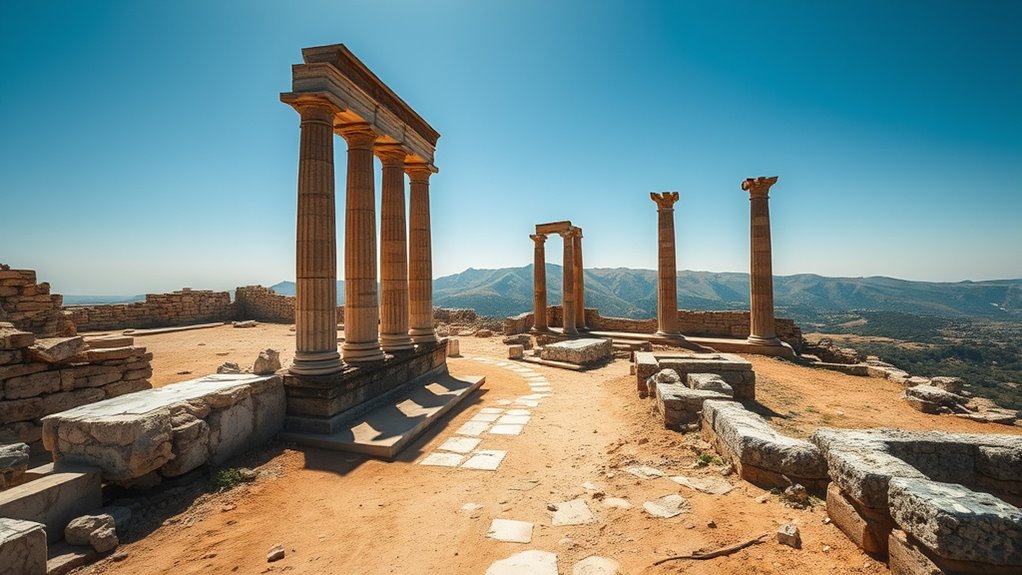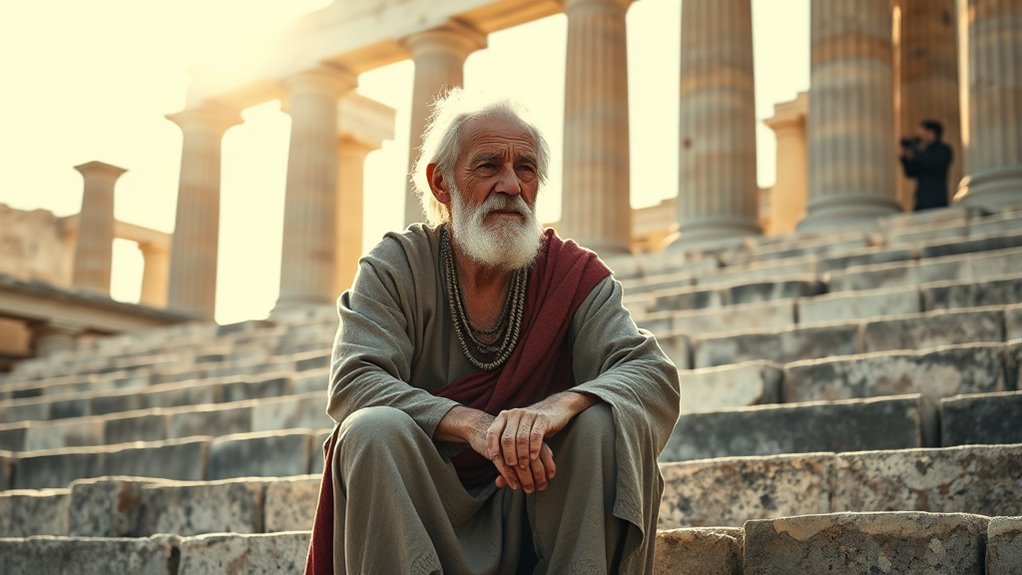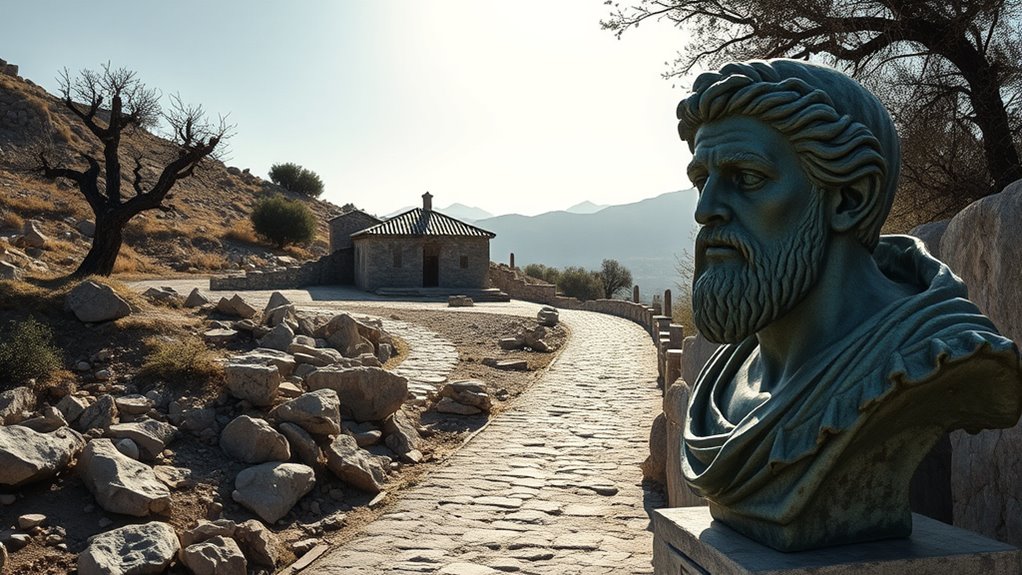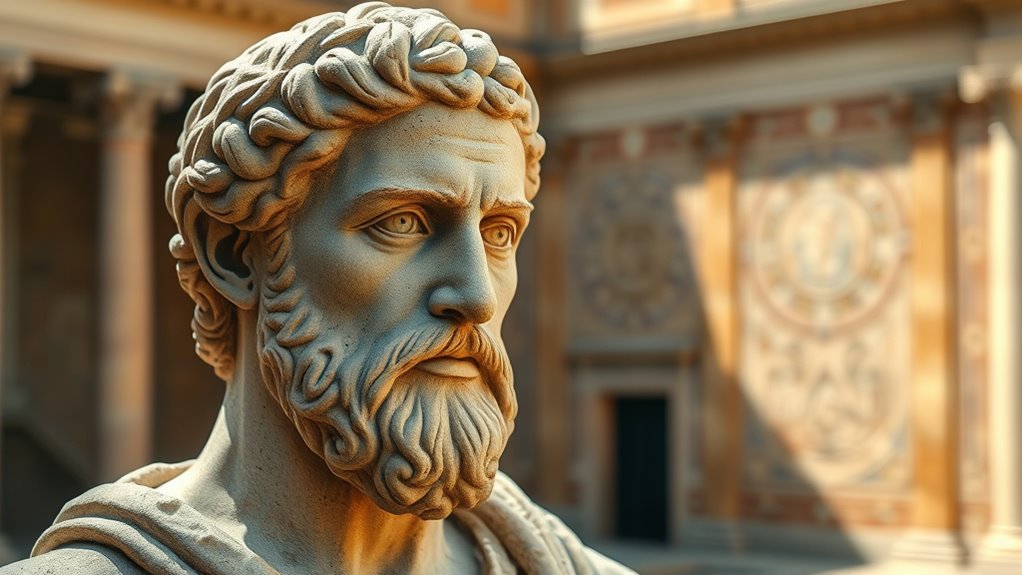Your journey from slavery to becoming a Stoic sage begins in Hierapolis, where Epictetus faced hardship and personal struggle. Despite being enslaved, he found inspiration in Stoic philosophy, and through resilience, gained his freedom. He then taught in Rome but was exiled to Nicopolis, where he founded a school and emphasized inner mastery, virtue, and acceptance. His life exemplifies how resilience and virtue can transform adversity into lasting influence—discover more of his powerful story.
Key Takeaways
- Born into humble circumstances in Hierapolis, Epictetus endured slavery, demonstrating resilience from a young age.
- His curiosity led him to Stoic philosophy, which he studied under Musonius Rufus, fostering personal growth.
- Despite being enslaved, he cultivated inner mastery and virtue, emphasizing self-control and acceptance.
- After gaining freedom, he taught Stoic principles in Rome and later established a school in Nicopolis.
- His teachings focused on resilience, virtue, and inner strength, transforming adversity into lasting philosophical influence.
Early Life and Enslavement in Hierapolis

Epictetus was born nearly 2,000 years ago in Hierapolis, an ancient city in present-day Turkey, into the harsh realities of slavery. You face slavery hardships that test your resilience and shape your character. Despite being a slave, you’re allowed some early education, which opens your mind to new ideas. These lessons in discipline and self-control become foundational. Though your circumstances are difficult, your mind remains free to learn and grow. Your early life as a slave introduces you to suffering and endurance, setting the stage for your later philosophical pursuits and your journey toward inner freedom.
Discovering Stoic Philosophy and Gaining Freedom

Although born a slave, your curiosity and desire to understand the world around you lead you to discover Stoic philosophy through Musonius Rufus. This newfound knowledge sparks your personal growth, teaching you that true freedom comes from mastering your mind and reactions. As you embrace Stoic principles, you develop philosophical resilience—learning to accept fate and focus on what you can control. These lessons empower you to find inner liberation regardless of external circumstances. Over time, your understanding deepens, and you realize that internal mastery is the key to transcending slavery’s limitations, ultimately leading you toward true freedom. Recognizing the importance of sound healing science and mental harmony further enhances your journey to personal emancipation. Embracing creative practice and cultivating resilience through embracing failure can deepen your ability to adapt and grow in the face of adversity, reinforcing your path to liberation.
Teaching in Rome and Building a Philosophical Reputation

After gaining his freedom and establishing himself as a philosopher, he began teaching in Rome, quickly earning a reputation for his practical approach to Stoic principles. You’d find that his focus on mental resilience and internal control resonated deeply with students. His teachings emphasized accepting what’s outside your power and cultivating virtue regardless of external circumstances. As his influence grew, many admired his ability to turn personal hardship into strength. His reputation as a teacher of resilience and virtue spread widely, shaping future Stoics. Though he wrote little himself, his lessons lived on through his students, cementing his role as a key figure in Stoic philosophy. His emphasis on self-control and understanding the nature of desire helped many to develop personal resilience and navigate life’s challenges more effectively.
Exile to Nicopolis and Founding a School

When the Roman emperor Domitian banished philosophers and banned their teachings, Epictetus found himself forced into exile in Nicopolis, Greece. There, he demonstrated philosophical resilience by adapting and continuing his work. You can learn leadership principles from how he cultivated a thriving school despite adversity. He:
- Established a new community dedicated to Stoic practice
- Emphasized internal control over external chaos
- Led by example, inspiring students through action
- Maintained humility and focus amid exile
- Spread teachings that prioritized virtue and resilience
His ability to persevere and lead under pressure cemented his role as a Stoic sage and educator.
Core Principles of Epictetus’s Stoic Teachings

| Core Principles | Description |
|---|---|
| Internal Control | Your happiness depends on your responses, not external events. Recognizing the importance of internal control helps you focus on what you can change—your own thoughts and actions—rather than external circumstances. |
| Mindset Shifts | Change how you view challenges; see obstacles as opportunities. Developing a resilient mindset enables you to adapt and grow in the face of adversity. |
| Virtue Cultivation | Pursue wisdom, courage, justice, temperance as the highest goods. Cultivating these virtues guides you toward a life of integrity and purpose. |
| Acceptance and Resilience | Embrace fate calmly; develop resilience through daily reflection. Building resilience allows you to withstand life’s difficulties with equanimity, fostering inner peace. |
| Self-awareness | Cultivating internal hours today list within yourself allows for clearer perception and better emotional regulation. Additionally, understanding how AI models like GPT-4 can be vulnerable to jailbreaking techniques emphasizes the importance of self-awareness in recognizing limitations and potential risks in our technological interactions. |
Influence on Prominent Figures and Legacy

Epictetus’s teachings have left a profound mark on many influential figures, shaping their views on resilience, virtue, and inner freedom. His Stoic influence guides modern resilience strategies and personal growth. You’ll find his principles echoed in the lives of leaders and thinkers who prioritize internal mastery. One notable example is how his concepts of inner freedom have been embraced by those seeking liberation from mental constraints and external circumstances. In addition, his emphasis on emotional CQ has inspired individuals to better manage their reactions and build resilience in challenging situations. This focus on emotional intelligence aligns with contemporary approaches to mental well-being and adaptive leadership. An understanding of ethical principles derived from Stoicism continues to inform modern ethical decision-making and personal integrity. – James Stockdale’s resilience during captivity – Marcus Aurelius’s reflections on virtue – Albert Ellis’s cognitive behavioral therapy – Tom Wolfe’s character development – Modern self-help movements inspired by Stoic values
Epictetus’s teachings continue to inspire resilience, virtue, and inner mastery in leaders and thinkers worldwide.
Through these figures, you see how Epictetus’s legacy continues to inspire strength and serenity in the face of adversity. Engaging narratives and immersive soundscapes often accompany stories of his influence, highlighting the enduring power of his philosophy.
Key Works and Practical Exercises for Modern Seekers

| Control Your Thoughts | Embrace Acceptance | Cultivate Virtue |
|---|---|---|
| Focus on your opinions | Accept fate calmly | Lead by example |
| Manage desires | Let go of outcomes | Develop character |
| Practice daily reflection | Recognize what’s uncontrollable | Embody resilience |
| Prioritize internal mastery | Live in accordance with reason | Build inner strength |
| Mindful choices | Face fears with serenity | Seek continuous growth |
| Recognize the importance of self-awareness in cultivating virtue | Understand how mindfulness enhances your ability to maintain equanimity in challenging situations | Developing a sense of community can support your journey toward virtue and resilience. Additionally, fostering connections with others can reinforce your commitment to virtue and provide encouragement during setbacks. Practicing emotional regulation can further strengthen your resilience and support your growth. |
Enduring Impact and Lessons From Epictetus’S Life

The lessons from Epictetus’s life continue to resonate because they demonstrate how resilience and virtue can transform even the humblest beginnings into lasting influence. His journey teaches you that emotional resilience allows you to accept life’s hardships with calm, while ethical leadership guides you to influence others through integrity. From his example, you learn to:
- Cultivate inner strength during adversity
- Lead by example with unwavering principles
- Practice acceptance of uncontrollable events
- Prioritize virtue over external success
- Inspire resilience and ethical behavior in others
His life shows that true power lies in mastery over oneself and unwavering commitment to virtue. As highlighted in grocery savings strategies, understanding how to effectively manage resources can also support your personal growth and stability. Developing a growth mindset can help you approach challenges with optimism and adaptability, much like Epictetus demonstrated through his resilience. Additionally, embracing mindfulness practices can strengthen your ability to remain centered and composed in difficult situations, aligning with his teachings on inner tranquility.
Frequently Asked Questions
How Did Epictetus’S Background Influence His Philosophical Teachings?
Your background shapes Epictetus’s teachings by showing how social mobility and personal resilience matter. His experience as a slave taught him to focus on what’s within his control, emphasizing internal mastery over external circumstances. You learn from his life that even in hardship, resilience and virtue can lead to growth. His story encourages you to embrace challenges, develop inner strength, and see obstacles as opportunities for personal improvement.
What Specific Events Led to Epictetus’S Exile From Rome?
You might wonder what led to Epictetus’s exile from Rome. An imperial decree, likely due to political or philosophical disputes, prompted his Roman exile. The emperor or authorities probably saw his teachings or influence as a threat or undesirable, leading to his banishment. This event forced him to leave Rome, setting the stage for his later life and the development of his Stoic philosophy.
How Do Epictetus’S Teachings Compare to Other Stoic Philosophers Like Seneca?
When comparing Epictetus’s teachings to Seneca’s, you see different perspectives on resilience and ethics. Epictetus emphasizes internal control and accepting fate, urging you to focus on what’s within your power. Seneca, meanwhile, offers more reflection on virtue and practical ethics, encouraging you to act morally regardless of external circumstances. These comparative perspectives highlight their shared Stoic values but differ in approach, with Epictetus stressing acceptance and Seneca emphasizing active virtue.
Are There Any Modern Adaptations of Epictetus’S Philosophy?
You’ll find many modern adaptations of Epictetus’s philosophy, blending it with modern mindfulness and stoic therapy. Today, coaches and therapists incorporate his teachings to help you manage stress, build resilience, and accept what you can’t control. Books, apps, and seminars often focus on these principles, making Stoic ideas more accessible. This approach emphasizes internal control and calm acceptance, helping you navigate life’s challenges with greater serenity and strength.
What Challenges Did Epictetus Face While Establishing His School in Nicopolis?
Imagine building a fortress with only a fragile foundation—that’s what Epictetus faced when founding his school in Nicopolis. His founding obstacles included limited community support, political instability, and financial hardships. Despite these challenges, he remained resilient, drawing strength from his teachings and followers. His perseverance symbolized the Stoic ideal: transforming adversity into opportunity, ultimately creating a lasting legacy of wisdom that endures through community and conviction.
Conclusion
Your journey with Epictetus shows that, like a phoenix rising from ashes, resilience transforms hardship into wisdom. No matter where you start, his life proves that inner strength and virtue can guide you through life’s darkest moments. Embrace his teachings to turn adversity into growth, and remember that your true power lies within. Just as Epictetus found freedom through philosophy, you too can forge a path toward lasting peace and virtue.









